
You want to know more about what Canadians are eating? What’s in their plate and where is it coming from? What grows in Canada and what is the impact of agriculture on the environment? Read Radio Canada International’s reports on these topics!
Children eating poorly at school, study finds
By Lynn Desjardins, Sunday 27 August, 2017

A new study suggests Canadian children are not eating enough good food at school to meet their dietary requirement of vitamins and minerals. Researchers at the University of British Columbia also found that during school hours, students were eating less nutritious foods like sweet drinks, salty snack and candies… more
Canadian food classics and some indigenous connections
By Carmel Kilkenny, Saturday 19 August, 2017

© CP/Chris Young
Canadian food is as wide and varied as the many people who now make this country home. But for Elizabeth Baird, who has been writing about food and working on cookbooks for over 40 years now, the roots of several of our favourite things to eat, and the traditions around them continue to fascinate her… more
Pressure mounts to ban junk food marketing to children
By Lynn Desjardins, Monday 14 August, 2017

© Associated Press
The Canadian government has just closed its online public consultations on the plan to ban unhealthy food advertising aimed at children. A coalition of 12 non-governmental organizations will keep up the pressure for it to restrict the commercial marketing of food and beverages to those under 16 years old… more
Some big lifestyle changes may be coming for Canadians AND our animals
By Terry Haig, Thursday 20 July, 2017
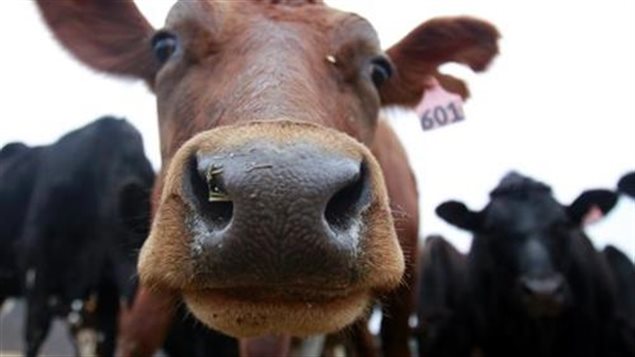
© CBC
For the first time since 2007, Health Canada is planning some progressive changes to Canada’s Food Guide–changes that–if followed–will go a long way to make a whole lot of Canadians feel a whole lot better–and healthier… more
Succession: Whither the family farm in Canada?
By Marc Montgomery, Monday 17 July, 2017

© Adrees Latif/Reuters
Canadian farmers are ageing, and very few have plans for children or others to take over their operation. In fact, Statistics Canada found in a survey last year that over 90 per cent of farms had no written plan for succession when the operators retire… more
Guaranteed income is a solution to food insecurity: report
By Lynn Desjardins, Monday 3 July, 2017
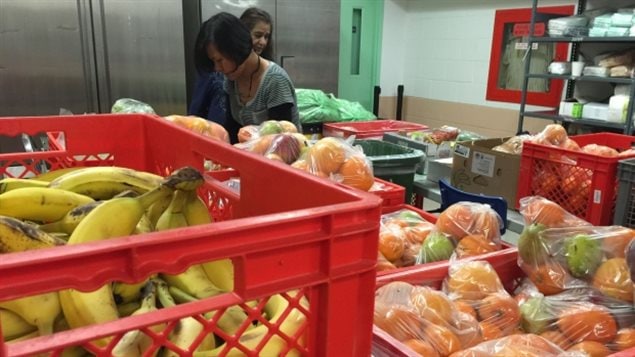
© Carla Turner/CBC
A new report suggests that a good way to address the problem of food insecurity in Canada is to provide a guaranteed basic income to those in need. It’s estimated one in eight households in Canada’s richest province of Ontario is in a situation of inadequate or insecure access to food. That is believed to be slightly fewer than the national average… more
More animal cruelty charges at huge factory dairy farm
By Marc Montgomery, Thursday 29 June, 2017

© Mercy for Animals
The non-profit agency promoting care for farm animals Mercy for Animals Canada released a secretly filmed video from inside Canada’s largest factory dairy operation. The 2014 hidden camera video shows dairy cows being severely beaten with canes and chains, punched, kicked, and lifted into the air by chains around their necks… more
Food Policy in the works for Canada
By Carmel Kilkenny, Tuesday 27 June, 2017

© D. Bronson
Food Policy on a national scale has been a long time coming to Canada. But now the process is underway. At the end of May, Lawrence MacAulay, Minister of Agriculture and Agri-Food, announced that consultations would begin, and the government was committed to creating a national policy… more
Whose junk food is it anyway?
By Marc Montgomery, Thursday 29 May, 2017

Fries, gravy and cheese curds: poutine. now being embroiled in a question of cultural appropriation. © via CBC
It seems the conflicts over the contentious isse of “cultural appropriation” is now involving a fast food dish in Canada. Poutine, a mix of fried potato chips, a brown gravy, and cheese curds, was created in Quebec in the 1950’s… more
Eating habits reflect changes in Canadian society
By Lynn Desjardins, Thursday 18 May, 2017

A new study shows big differences in how Canadians eat depending on their gender, generation and incomes. Researchers at Dalhousie University surveyed 1,019 people over 18 years old across all the provinces for three weeks in April… more
Canadian farms: fewer, bigger, older
By Marc Montgomery, Monday 15 May, 2017

© Amanda Brodhagen
It seems that the amount of farmland in Canada is growing, but the average age of operators (farmers) continues to increase, while the numbers of actual farms is slowly decreasing. These are the latest findings from the national statistics gathering agency Statistics Canada. It’s part of a detailed analysis called the Census of Agriculture… more
Northern climate farm fields: an unexpected source of greenhouse gas
By Marc Montgomery, Wednesday 12 April, 2017
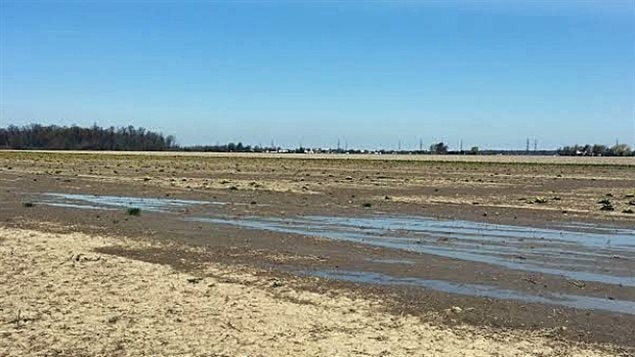
© Brendan Byrne, via CBC
A Canadian farm field in spring as the snow melts may look present a tranquil picture, but there’s something dramatic taking place unseen to our eyes. A new study in Canada found a surprising level of nitrous oxide emissions from thawing crop fields, a figure that has been greatly underestimated by climate researchers… more
Canadians watch cooking but don’t do it, says researcher
By Lynn Desjardins, Friday 24 March, 2017

© CBC
Canadians spend more time watching cooking shows than they do cooking, and they spend less time eating than almost anyone else in the world, according to recent research. Canadians are losing the art of cooking says, Sylvain Charlebois, a professor of food distribution and policy at Dalhousie University in the eastern city of Halifax. He says part of the problem is Canadians’ lifestyle... more
63 per cent of Canadians are concerned about food fraud: study
By Levon Sevunts, Tuesday 21 February, 2017
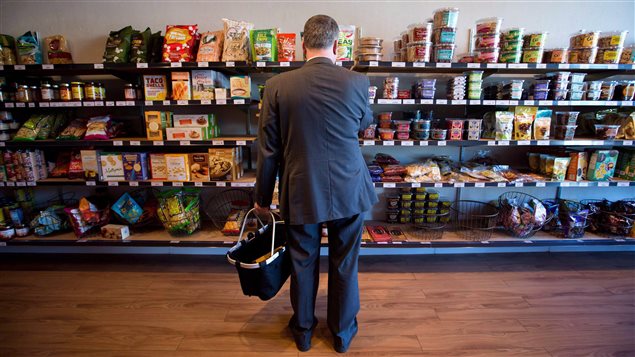
© PC/Darryl Dyck
Almost two-thirds of Canadians are worried that the food they buy in grocery stores or markets is either counterfeited, adulterated or misrepresented, according to a new study by researchers at Dalhousie University in Nova Scotia… more
Canada should adopt seafood traceability rules, says group
By Lynn Desjardins, Saturday 11 February, 2017
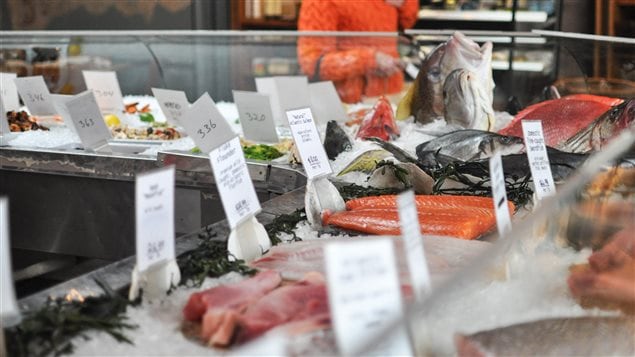
© Oceana Canada
The European Union and other jurisdictions have rules to ensure that seafood comes from sustainable sources and is caught through fair practices. But there has been fraud. In response, the United States has issued new traceability rules… more
Group demands a stop to the marketing unhealthy foods to kids
By Lynn Desjardins, Wednesday 1 February, 2017

© iStock
“The food and beverage industry is marketing our children and youth to death,” says the Heart and Stroke Foundation of Canada. It has produced a new report which found unlimited advertising has dramatically increased the consumption of unhealthy food and drink.… more
Major restaurant chain moves away from clients with food allergies
By Marc Montgomery, Wednesday 25 January, 2017

© Nicole Williams/CBC
One of the world’s largest international food retailers is McDonald’s. Recently McDonald’s Canada announced that they could no longer guarantee their foods would not come into contact with peanuts. This represents a major policy change for the restaurants and a new challenge for those with food allergies… more
Turning garbage into food -“green” and delicious
By Marc Montgomery, Thursday 5 January, 2017

© Radio-Canada
It was a bold gamble that is paying off for two Montreal women. In a small non-descript warehouse in the central Montreal borough of Hochelaga-Maissoneuve, something unique is happening. The women are creating a food item from a variety of waste products… more
New food labelling rules spark mixed reaction
By Terry Haig, Thursday 15 December, 2016

Canada’s federal government on Wednesday announced an overhaul of nutrition labels on packaged goods aimed at making healthy food choices easier. Federal Health Minister Jane Philpott said amendments to the Food and Drug Regulations will affect the list of ingredients and nutrition facts on the information boxes on the back of food products… more
Eating plant protein helps those with unhealthy habits
By Lynn Desjardins, Thursday 4 August, 2016

© Christy Brissette, 80 Twenty Nutrition
People who drink, smoke, are inactive or overweight may live longer if they eat more plant protein like beans, nuts and seeds, according to a new study. This is consistent with other studies which suggest benefits for people who increase their intake of plant protein and reduce the amount of meat they eat.… more


